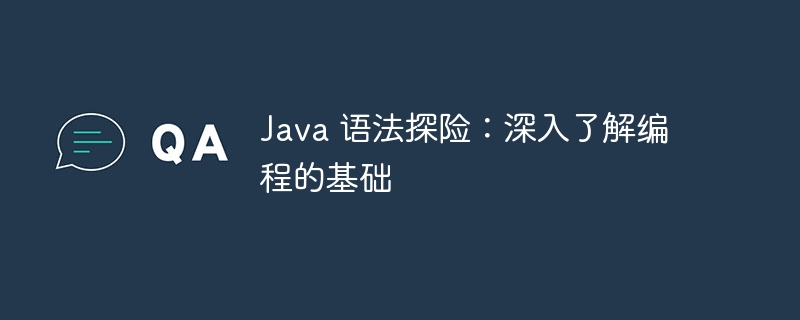
Java is one of the most popular programming languages currently used for developing various desktop applications, web applications, and mobile applications. Java syntax is relatively simple, but some basic programming issues may trouble beginners. PHP editor Baicao will delve into the basics of Java programming for you, allowing you to better master this language. From variables and data types, to control flow and functions, we will comprehensively explain the basics of Java programming in this article to help you quickly become a Java programmer!
Java syntax is built on clear and concise rules and consists of the following basic structures:
-
Data types: Java supports basic types (such as int, float) and reference types (such as String, Object).
-
Variables: Variables are used to store data values and need to be declared using data types.
-
Operators: Operators perform mathematical and logical operations.
-
Flow control: Conditional statements (if, else, switch) and loops (for, while, do-while) control program flow.
-
Method: Method is a function that encapsulates code and has specific parameter and return value types.
-
Classes and objects: Java adopts Object-orientedProgramming, classes define object blueprints, and objects are instances of classes.
Advanced concepts:
Java syntax also covers more advanced concepts, such as:
-
Inheritance: Subclasses can inherit the properties and methods of the parent class to achieve code reuse.
-
Polymorphism: Subclasses can override the methods of the parent class to achieve different behaviors.
-
Abstract classes and interfaces: Abstract classes provide templates that force subclasses to implement specific methods, while interfaces define contracts that must be implemented by the implementing class.
-
Exception handling: Java exception handling mechanism handles errors that occur during code execution.
-
Generics: Generics allow the creation of code that spans different data types, improving code reusability and flexibility.
-
Lambda expressions: Lambda expressions are anonymous functions that simplify code in functional programming.
Best Practices:
In order to write clean and maintainable Java code, it is important to follow the following best practices:
-
Follow coding conventions: Use consistent indentation, naming, and comments.
-
Use the appropriate data type: Select a data type that matches the range of data values.
-
Optimize code efficiency: Avoid unnecessary loops and conditional statements.
-
Conduct unit testing: Write test use cases to verify the correctness of the code.
-
Documented code: Provide comments and documentation strings to explain the purpose of the code.
in conclusion:
Java syntax is a broad and powerful tool that is essential for writing robust and maintainable software. From basic syntax to advanced concepts, a deep understanding of Java syntax is essential. By following best practices and continuing to learn, programmers can take full advantage of Java's capabilities and create efficient and reliable applications.
The above is the detailed content of Java Syntax Adventure: Deep dive into the fundamentals of programming. For more information, please follow other related articles on the PHP Chinese website!

